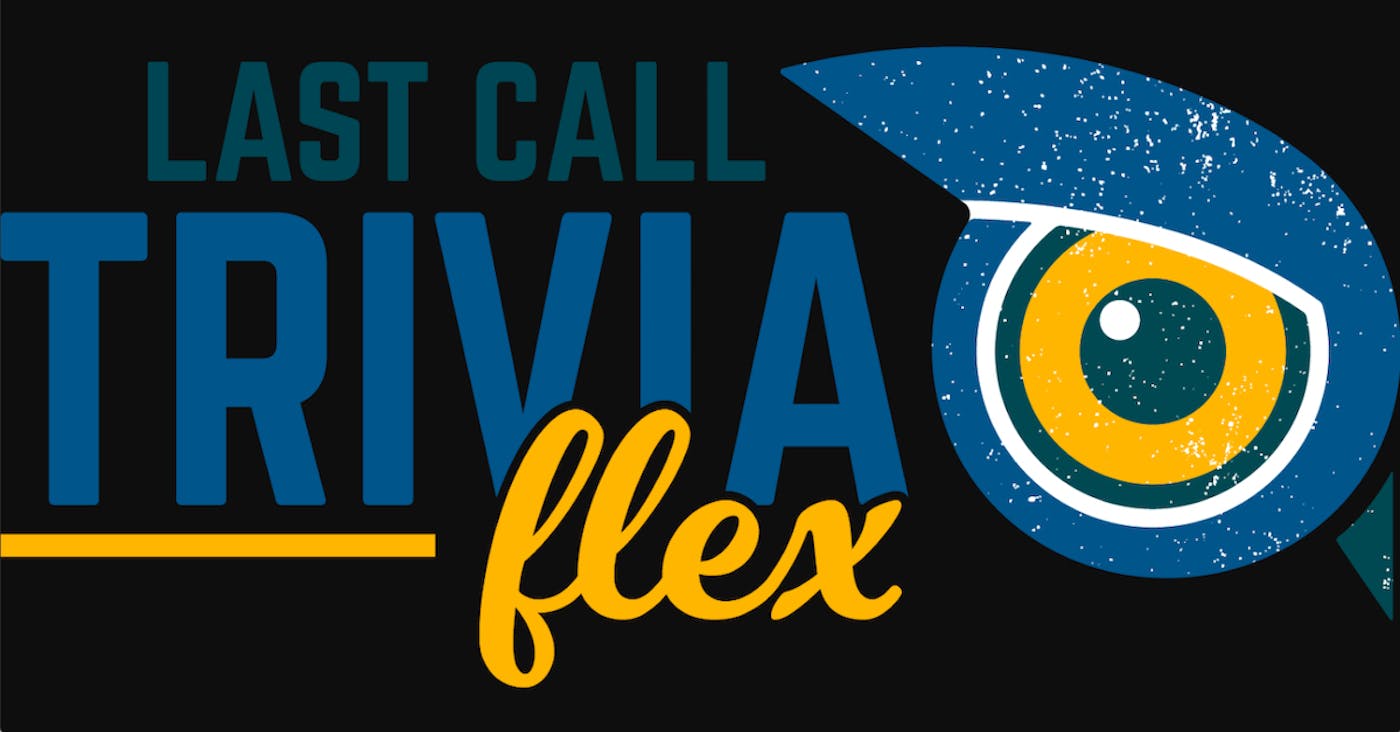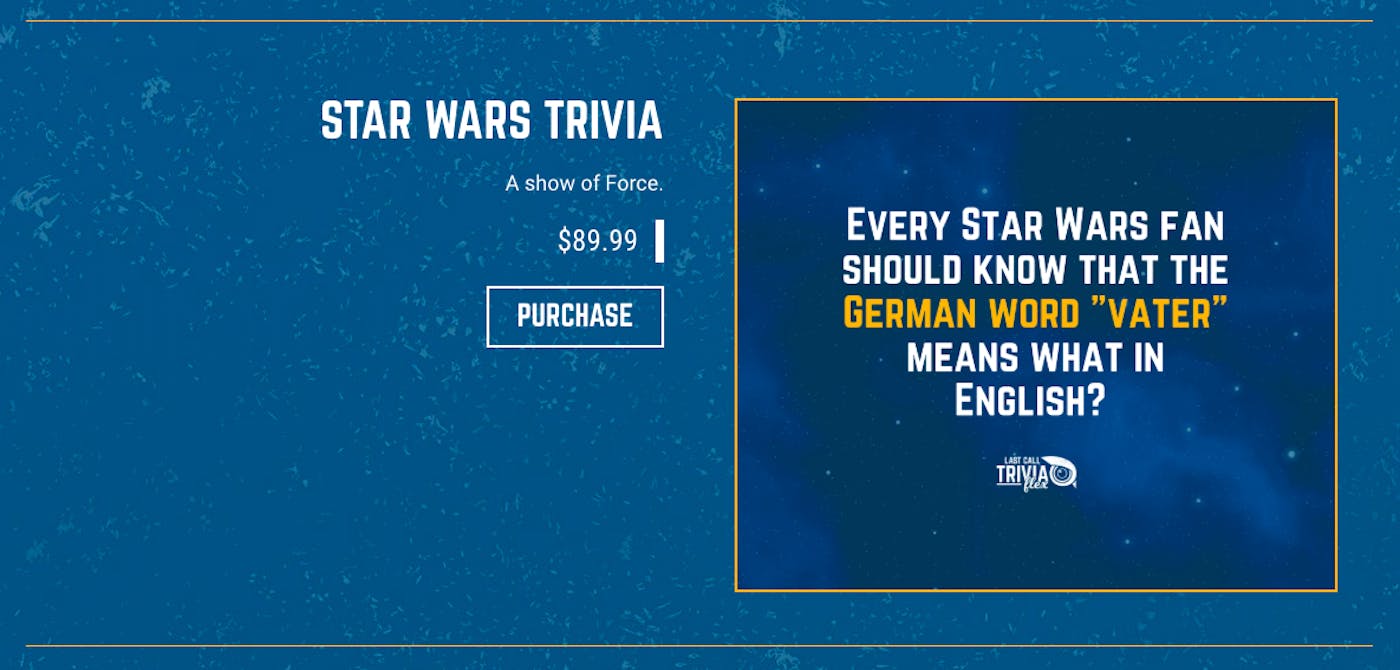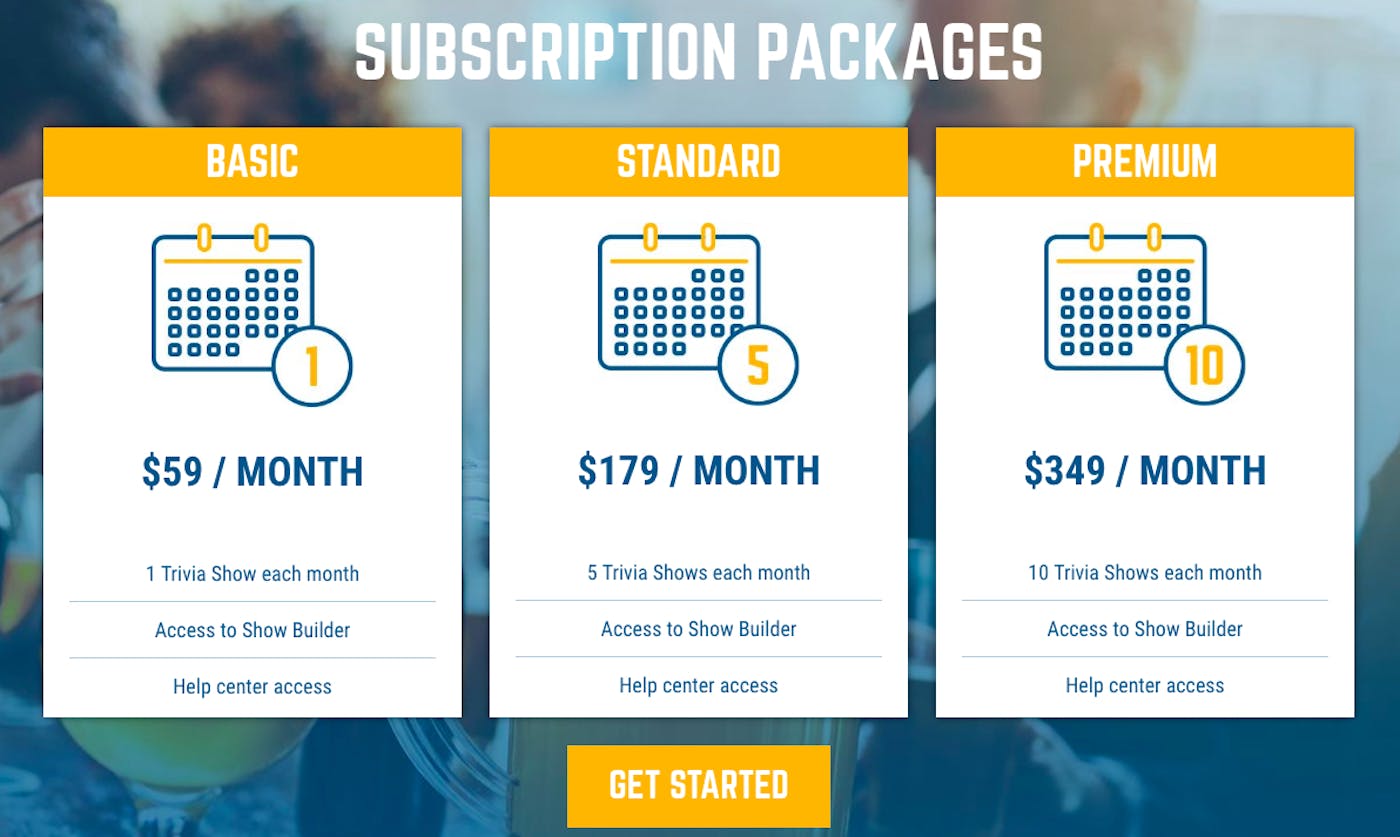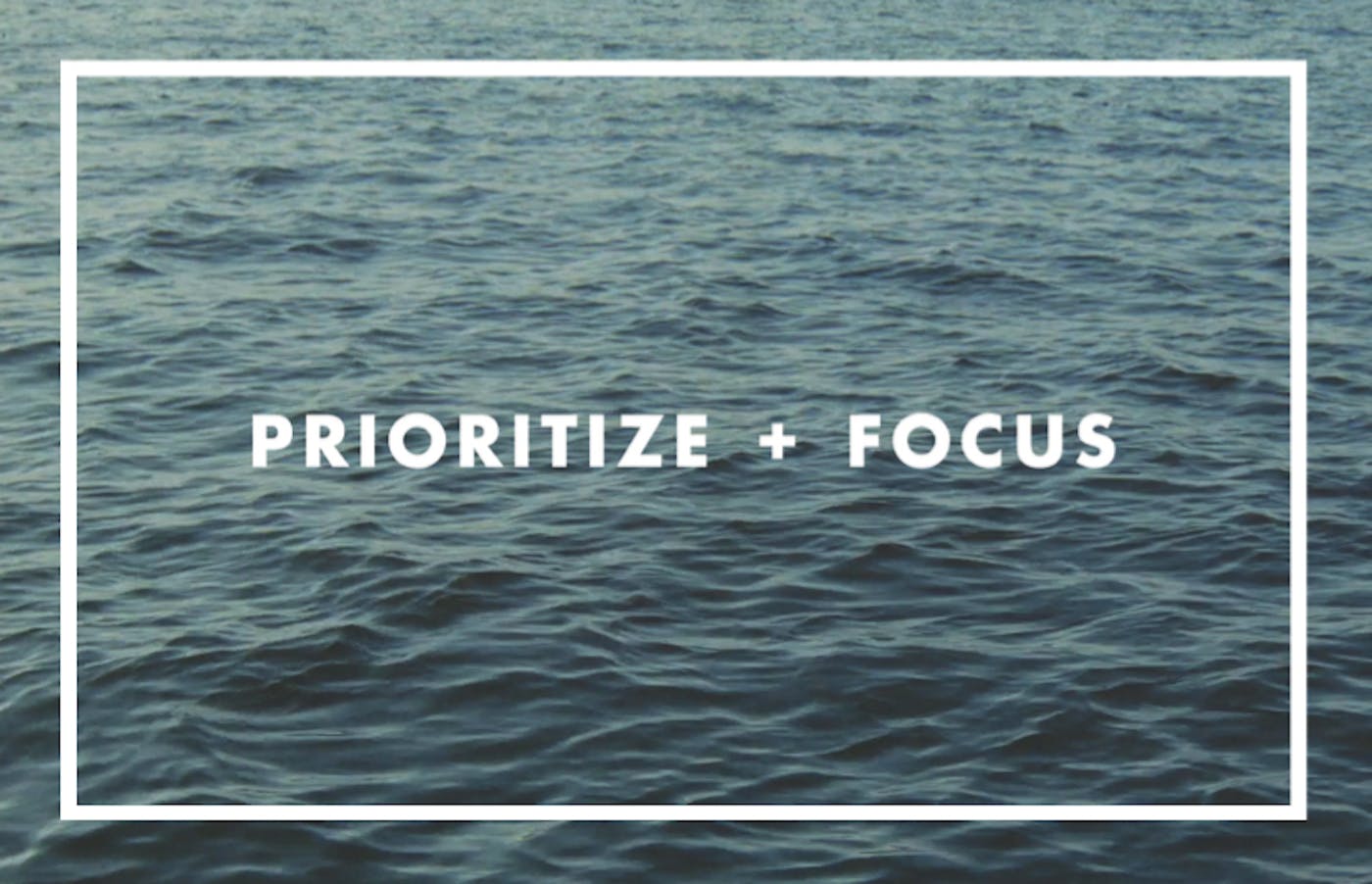How I Went from Bartender to Side Hustler to CEO by Doing What I
Love
Hello! What's your background, and what are you working on?
Hi, my name is Adam Johnston and I’m the CEO and co-founder of Last Call Trivia. My current project is Last Call Trivia Flex—a DIY Trivia Night service that allows users to generate their own customized Trivia shows.
I started Last Call Trivia with my buddy, Drew Turner, back in 2007. We were playing Trivia with friends at a local bar when we realized that we could create a much better Trivia show experience than the other companies we’d seen. Drew and I started hosting Trivia Nights in the Cincinnati area, and we quickly scaled up our business and added on new hosts. Our Trivia Nights started to spread, and we soon had shows across the country from Cincinnati to Anchorage.
As our business continued to grow, Drew and I considered how we could effectively spread our Trivia Nights to cities where we didn’t have feet on the ground, as well as meet the growing demand of bars wanting more control over the categories and questions used during their shows. And with that came our Flex platform. Flex gives users the ability to create their own custom Trivia shows with our database of professionally written, fact-checked, and audience-approved questions. Flex also includes access to game materials, promotional graphics, and training resources to take all of the guesswork out of a DIY Trivia Night. Flex is the future of Trivia Nights.
Currently, our full-service revenue is around $140,000/month and our Flex revenue is around $2,000/month.

What motivated you to get started with Last Call Trivia Flex?
Customization — The best Trivia Nights have questions that are tailored towards the demographics of the bar. Generally, Russian literature Trivia doesn’t go over well at a biker bar. We needed to find a scalable way to offer a custom show for each client across the country. Therefore, we took our knowledge of what makes a good Trivia show and designed our Show Builder so it could automatically generate shows that are not too easy and not too hard. Each new show has a variety of categories and questions that have never been used. This gives the user the ability to create a Trivia show with the click of a button or to design the show question-by-question using the filters in the Show Builder.
Increased Client Base — Logistically, it’s challenging to offer our traditional full-service Trivia Nights (where we provide the host, sound equipment, printed game materials, etc.) in remote cities where we don’t have feet on the ground. With a DIY model, we can give bar owners, or side hustlers looking to host their own Trivia Nights, everything they need to run a successful show without us being physically present.
Underutilized Assets — We already had a staff of expert writers from around the world and a library of original, unique content that had previously been vetted by a live audience. We saw an opportunity to recycle what we had poured our hearts and energy into creating.
Building Community — It’s been an incredible privilege to see the communities that have grown around Last Call Trivia. There have been more friendships, marriages, and babies attributed to our Trivia Nights than we can count. One of the most impactful stories comes from one of our players fighting multiple sclerosis whose doctor noticed significant improvements from playing Trivia regularly. Flex allows us to gift community and brain health to every corner of the world.

What went into building the initial product?
We were nervous to make the investment in Flex because no one else was doing it, but we were confident it was the right move to make. We came up with the idea in 2011, but we didn’t have the time or money to pursue it immediately.
We began formal planning stages towards the end of 2012 and started building Phase 1 in 2013. We had zero development experience on staff, so we got a Phase 1 quote from a developer we were working with at the time. We had no extra money in the bank back then to fund this, so we arranged a budget after that initial SOW (statement of work) so expenses wouldn’t go above a certain amount within a month. This slowed production tremendously, but it also gave us the time we needed to test the product as we went along. 2014 was spent on Phase 2, which added more robust functionality, such as improved Show Builder filters and auto-generation formulas.
We went to the National Restaurant Show in Chicago in May of 2015 to introduce our product to the world. The rest of 2015 and 2016 were spent improving Flex and trying to sell it via cold calling bars. We used 2017 and 2018 to fine-tune Flex’s functionality and overhaul the look to better match our branding.
How have you attracted users and grown Last Call Trivia Flex?
By creating a better product. The best Trivia questions spark debate amongst the teams. Rather than asking straightforward questions whose answers can just be rattled off, great Trivia Nights include questions that leave room for discussion. For example, take this question, “Name the actor or actress who is in all of the following movies: Fargo, The Big Lebowski, and Armageddon.” Some members of the team might have only seen one or two of the movies, but the hope is that their combined knowledge will lead them towards the right answer: Steve Buscemi.
As for selling, we relied on traditional methods such as cold calling and emailing bars and restaurants, attending trade shows, and sending mailers to grow our Flex client base. Our initial growth was slow, but we have seen a promising trend over the past year.
From January 2018 to January 2019, our number of Flex subscribers doubled. Traffic to the Flex site has also steadily been increasing since the second half of 2018.
| Month | Pageview |
| Aug ‘18 | 1411 |
| Sep ‘18 | 1529 |
| Oct ‘18 | 1579 |
| Nov ‘18 | 1690 |
| Dec 18 | 2271 |
| Jan 19 | 2446 |
One of the key factors that drove the 100% increase in Flex customers in 2018 was an overhaul of our sales and marketing efforts. Prior to last year, most of our outreach was done in the form of cold calling and emailing. This was a particularly tough way for us to gain traction because decision makers in the bar and restaurant industry are almost impossible to get a hold of, and are notoriously strapped for time.
Instead of continuing to try to swim upstream, we made the decision to optimize our efforts to make it easier for the right people to find us. We hired an SEO strategist, which has been a huge help to our team who previously relied on a mix of individual research and instinct when creating content. Our SEO strategist has taken on a number of projects, including revamping our Google Ads, optimizing landing pages and blog posts, and improving page loading speeds. This has helped our team capitalize on organic searches and has reduced our spend on pay-per-click advertising for non-relevant keywords.
We’ve also focused on increasing our name recognition through PR and press opportunities. In the first two months of 2019, I was featured on both the Side Hustle School and Side Hustle Nation podcasts. In the podcast interviews, I shared my story of transitioning from a side hustler to a CEO and gave tips for people looking to start their own Trivia side hustle.
A valuable lesson we’ve learned throughout the evolution of Flex is the importance of looking for all of the possible client bases that a product appeals to. During the initial development phases, we framed Flex as a product for bar owners, but we began to notice that a wide variety of clientele expressed interest in the service. That’s when we decided to reframe Flex across a variety of markets. Namely, markets that have the bandwidth to create their own shows and a greater need for customization. Two examples of segments we’ve gained traction with are side hustlers and lodges/private clubs (Moose Lodges, AmVets, etc), and we have other exciting segments in the pipeline.
What's your business model, and how have you grown your revenue?
Our primary source of Flex revenue is monthly subscription fees. There are several subscription options available for users based on the number of Trivia shows they plan to host each month. After signing up, our customers are charged on a monthly basis, at which time their show count “resets” for the month. Our payments are processed through Stripe.
We also offer individual Trivia shows for one-off purchases. These cover a variety of popular themes (Disney, Harry Potter, sports, general knowledge, etc), and are typically purchased for occasions such as fundraisers, corporate parties, and private events.

We do sell sound equipment and pre-assembled answer pads, though we sell these at cost as a convenience to our clients.
When determining the price for our Flex subscriptions, we were careful to consider the value that the service offers, and we priced it accordingly. We made the mistake in full-service of lowering our price in order to get clients, which often led to us acquiring the wrong types of clients. Not only did we make less money, but we had to spend more money in time and effort with the wrong clients.
Currently, we’re averaging right at $2,000 per month in Flex revenue. In 2018, our number of subscribers steadily increased, doubling from the start of the year to the end of the year.
| Quarter | Revenue |
| Jan ‘18 | 900 |
| Apr ‘18 | 1100 |
| Jul ‘18 | 1500 |
| Oct ‘18 | 1550 |
| Jan ‘19 | 1800 |
Our society often thinks of successful businesses as growing exponentially by catching a big break, but we think businesses grow in a more linear way at first. Find your customer acquisition cost and put as much money as you can behind it. Then, when you have more money coming in, you have more money to put behind what works, and you do so. Our business model is to reinvest 100% of our Flex revenue into marketing. It makes it easy to do being that our Flex margins are over 90%. The site is completely built and given the intuitive nature of the site, our clients rarely need help. New Trivia questions are already generated through our full-service company, so the only ongoing costs associated with Flex are uploading questions to the database and addressing questions that could potentially change.

What are your goals for the future?
Our goal is to get 10,000 Last Call Trivia Flex subscriptions. This will be accomplished primarily through the hospitality industry, though we’re excited to see where we can gain traction in other markets. Our biggest hurdle is going to be changing the mindset of bar and restaurant operators; they need to see that they can have a more successful weekly Trivia Night by hosting it themselves rather than outsourcing it to someone who isn’t as invested in their success.
Everything we’re doing is with the goal of becoming the name in the Trivia industry. When people think of Trivia, we want Last Call Trivia to come up with the likes of Jeopardy! and Trivial Pursuit. We’ll accomplish this by continuing to pump out a stellar product, refining our SEO tactics, understanding the analytics behind the decisions we’re making, producing content, starting conversations, and lowering our customer acquisition cost across all markets.
We have another Trivia game—Last Call Feud—that is wildly popular, but we made the decision to focus on solidifying our Trivia Night growth model. Feud Night is a very similar format to Trivia Night, but it challenges the players to guess the most popular surveyed answers rather than identifying correct and incorrect answers. This type of game will open us up to clients whose crowds don’t enjoy traditional Trivia Nights. It will also give us the opportunity to sell a second night of entertainment to current clients each week.
What are the biggest challenges you've faced and obstacles you've overcome? If you had to start over, what would you do differently?
Our biggest setback was not having the money and resources to get Flex going sooner. Our biggest hurdle was blazing this trail and doing all the wrong things in order to find out what works best.
If we had a do-over, we would hire a digital strategist sooner, focusing more of our Flex efforts on digital marketing and less on cold calling. One lesson we’ve learned the hard way: Don’t delay product releases for the sake of perfection; get things 80% right, put metrics in place to measure your successes, pull the trigger, learn, modify, and grow.
Have you found anything particularly helpful or advantageous?
The best investment we’ve made as a company is in culture. Our Flock (as we call ourselves) fosters a collaborative, dynamic work environment rooted in communication, expectation management, and consequence-based decision making. We frequently get together for Buffalos (fun get-togethers), and we have season ticket packages for the Cincinnati Reds and FC Cincinnati. A true testament to our focus on culture, the greatest compliment I’ve ever received is from the few people who have told me that they want to spend their career working with Last Call Trivia.
The thing that had the biggest impact on me personally in the past couple of years was getting into meditation. Neuroscientist Sam Harris—who is incredible and who you should absorb as much from as you can—has a guided meditation app called Waking Up. Download it and start there; he makes it super easy. If you can’t find 10 minutes in your day, you have bigger problems to work on.
I read a lot and love book recs, so here are some of my favorites:
- Stealing Fire by Steven Kotler & Jamie Wheal
- A New Brand World by Scott Bedbury
- Eat That Frog! by Brian Tracy
- Blue Ocean Strategy by W. Chan Kim & Renee Mauborgne
- Never Split the Difference by Chris Voss
- Man’s Search For Meaning by Viktor E. Frankl
- The Five Love Languages by Gary Chapman
What's your advice for indie hackers who are just starting out?
Find FLOW and stay in it as much as possible. I had this poster made, and it hangs on the wall in front of me while I work. It reminds me to focus and prioritize amidst a sea of noise and unpredictability.

Where can we go to learn more?
Last Call Trivia Flex. Watch the video, sign up for a free demo, and brainstorm all the ways you can use this product to make money for yourself. Also, check out our blog for some great resources—articles about trending topics in the bar industry, hosting tips, drink recipes, and all kinds of fun topics our Content Team comes across.
Facebook: @TriviaLovers
Twitter: @lastcalltrivia
Instagram: @lastcalltrivia
Feel free to reach out with questions or comments in the section below. Let us know what other market segments you think would benefit from customizable Trivia or tell us about your local Trivia Night. And hit us up if you’re interested in hosting a Trivia Night.
Go change the world...it makes for good Trivia.

I would love to know if anyone found my PRIORITIZE + FOCUS poster useful. What other daily reminders or affirmations do you use?
Congrats guys. What I love about this is that it reminds us we don't need to always be making the next big thing, a facebook per se, and you solve a problem you were particularly a right fit to solve (even if you didn't have all the resources or skills at the moment to solve it). Rock on
Thank you!
Hi @lastcalltriviaflex, how many hours a week do you dedicate to Flex?
I totally fall into the entrepreneurial trap of spending time on tasks that seem to be a necessity but don't move the company forward. I'd say, between a few people, we probably spend around 100 hours per week on Flex.
Hi Adam! Great interview, thank you for sharing. One question: How are you getting around the IP issues by selling one-off trivia shows using known brands like the Star Wars trivia? Do you have licensing partnerships with Disney, Harry Potter etc? If not, what is your strategy going forward on this? Thanks
Good question! Since Trivia questions are not considered IP and we don't use visual rounds in our format, licensing is not necessary in this case.